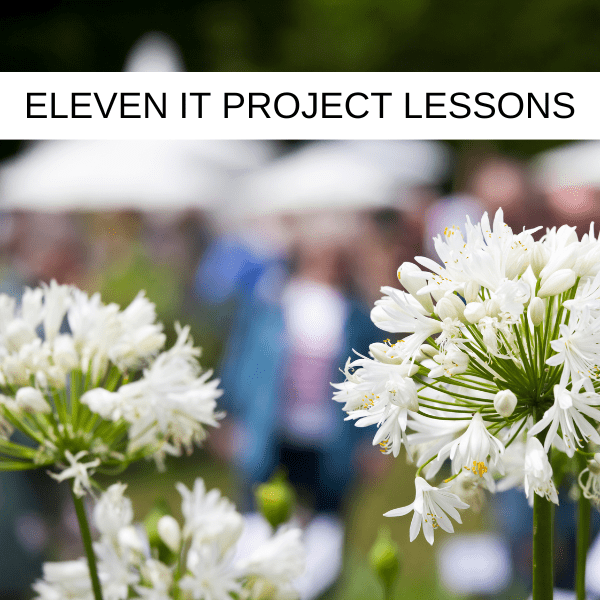Blog by Nicol Cutts, Head of Projects, Professional Services at Stoneseed.
In recent weeks, I’ve shared IT Project Management learning that can be gleaned from Crufts dog show and Chatsworth International Horse Trials.
It seems there’s an IT Project Management lesson everywhere you look!
When a colleague heard that I was heading to the RHS Tatton Garden Show in July, she said that even I couldn’t find project management teachings in the topsoil. Like most gardeners, I do love a challenge, so the gloves are, well, ON! Years of experience, and countless IT Projects under my belt, and a passion for plants and flowers! How hard can this be?
Sow, here we grow!
1 – The Value of Planning and Preparation
Lesson from Tatton – A great garden starts with thorough planning, this can include selecting the right plants for the desired outcome, preparing the soil, ensuring you have well maintained resources, and factoring in things like access to sunlight and water.
IT Project Management Lesson – IT projects also require meticulous planning and preparation. For us, this means defining project goals, identifying resources (and any resource gaps and filling them), constructing realistic timelines, and factoring in potential risks. Adequate planning is at the root of all IT Project success. A Business Analyst to define the business case and provide data-led insight and an effective Project Management Office to oversee planning and governance are becoming essential assets.
2 – Patience and Persistence Pays
Lesson from Tatton – Gardeners need patience. Lots of patience. Plants take time to grow, to bloom, and in some cases to bear fruit (and some years bear no fruit at all!!) Gardeners are patient and persistent, they consistently care for their plants regardless of setbacks or slow progress, there’s no point shouting, “Come on, just grown one sodding apple!!!” at a tree.
IT Project Management Lesson – Patience and persistence are character traits of the best IT Project Managers too. Complex IT projects encounter delays, setbacks, unforeseeable challenges, although, come to think of it, I have heard Project Managers scream the words “sodding Apple” from time to time. PMs and their teams must remain resilient, stay motivated, and continue working towards their project’s goals with dogged perseverance.
3 – The Right “Tool” For the Job
Lesson from Tatton – You wouldn’t dig out the hole for a pond and water feature with a trowel, nor would you rake up autumn leaves with a spade. Gardening is an efficient hobby and much of that comes down to selecting the best tool for the job. If you find you don’t have the right tool, that’s a great excuse for a trip to the garden centre or B&Q!
IT Project Management Lesson – Success in our line of work can be dependent on having the correct resources in place too. All too often though, organisations restrict their potential by relying just on the talent they have inhouse. Stoneseed’s Project Management as a Service (PmaaS) model provides access to the right project professionals, resources and tools at the right time (at a flexible, predictable cost), and our services portfolio offers a true end to end service, from IT Technical Advisory, Business Analysis Services and PMO Services through to Programme & Project Delivery.
4 – Nurture and Maintain!
Lesson from Tatton – Plants need to be nurtured and will not thrive without regular care, like watering, pruning, and, of course, pest control. Neglecting these, often daily, disciplines can cause your plant’s growth to be less than you’d hoped for or, worse case, it could even die.
IT Project Management Lesson – Projects are also very needy! Project Managers must actively monitor progress, identify and address issues promptly, effectively allocate resources, prune excess growth (mitigate scope creep!) and ensure that the project stays aligned with its business objectives. Remember, like plants, projects can fail without proper nurture and maintenance.
Project talent needs to be nurtured too, with ongoing training, and project teams must stay up to date with latest best practice and thinking.
5 – Be Adaptable and Flexible
Lesson from Tatton – Your garden is at the mercy of the unpredictable! Heavy rain that floods one day, baking sun that burns everything to a crisp the next! Then there’s infestations of insects, and attacks from slugs, rodents, my colleague Helen’s garden is often under siege from deer!!! Successful gardeners are adaptable and adjust strategy and technique to overcome these challenges.
IT Project Management Lesson – Pests can attack IT Project timelines too, stakeholders requesting scope changes, resource challenges, supply chain problems and technology issues. Project Managers must be flexible, able to adjust plans, and find creative solutions to keep their projects on track, like sourcing talent via Project Management as a Service (PmaaS).
6 – Thorough Understanding of The Life Cycle
Lesson from Tatton – Plants grow at different rates and have varying growth cycles, from seed to full bloom. Gardeners learn and understand these cycles and adjust care routines to suit.
IT Project Management Lesson – Projects go through phases too, from initiation to planning, , monitoring, and delivery. Project Managers must have a thorough understanding of these phases, apply the appropriate methodology, adjusting their management approach based on the project stage. Also, across a portfolio there may be separate projects with dependencies that require the same resources, great portfolio managers are skilled at ensuring dependencies don’t need the resources at the same time, or if they do, that they have a back-up resourcing strategy.
7 – Symbiosis, Collaboration and Diversity
Lesson from Tatton – A diverse garden, with various types of plants, creates a balanced ecosystem. I love learning how different plants (and other garden friends) make their own unique contribution. Some plants attract pollinators, or ladybirds to see off greenfly. Other plants and earthworms improve soil health.
IT Project Management Lesson – A diverse IT Project team, with a range of skills and expertise creates a natural culture of innovation, problem-solving, and operational resilience. Collaboration among team members from different backgrounds boosts creativity, productivity, knowledge sharing and a heightened ability to tackle project challenges. Stoneseed’s PmaaS talent, being experienced across multiple technology solutions, sectors and industries, bring experience in spades! If you work with “external” talent, be sure to become a knowledge sponge!
8 – Sustainability
Lesson from Tatton – Successful gardeners are long-term thinkers, considering factors like sustainability, ecological impacts, soil health and which plants will thrive best in the plot next after what you planted this year has died.
IT Project Management Lesson – IT Projects are often laser-focussed on short-term goals but increasingly also factor in long-term thinking and objectives: eco- and organisational-sustainability; scalability; ongoing maintenance requirements; and post-delivery support needs; etc. Optimising this level of thinking and planning delivers lasting business value.
9 – Risk Management and Contingency Planning
Lesson from Tatton – As well as being adaptable and flexible in the event of risks, gardeners try to anticipate and mitigate risks like weather extremes, diseases, or pests. A sharp frost is not totally unpredictable, so checking the forecast and overnight lows can allow a contingency plan to be put in place, like protective covers.
IT Project Management Lesson – Project Managers must also identify potential risks early in the project lifecycle and, like our green fingered friends, develop go-to risk mitigation strategies, with contingency plans ready to roll into action. For instance, resource issues or talent gaps can be addressed with professionals from the PmaaS market, or Project Management Office advisory services can help strengthen your existing PMO, taking a proactive approach minimises risk, disruption and ensures ongoing project resilience.
10 – Feedback Loops and Iterative Improvement
Lesson from Tatton – Searching Amazon for books on gardening will give you a small idea of the repository of knowledge that exists. This was all collected by gardeners planting and observing, noting plant growth, monitoring health, measuring yield, and recording feedback from their observations to adjust watering, fertilisation, or planting strategies to improve outcomes. Doesn’t this sound familiar?!
IT Project Management Lesson – Project teams must also gather regular feedback from stakeholders, end-users, team members and real-time project data to evaluate project progress, identify areas for improvement, and make iterative adjustments. Continuous feedback loops propel project quality to higher levels and lead to increased stakeholder satisfaction – and that’s the kind of feedback we love!
11 – Optimise Resources!
Lesson from Tatton – This leans into our section on sustainability too, gardeners are great at optimising available resources. Water, for instance, falls out of the sky regularly in the UK and by using a water butt to capture some of it, you have water ready for dry sunny days. Then there’s composting, literally creating fertiliser from decaying organic material from grass clippings to tea bags! Now that’s resource optimisation!
IT Project Management Lesson – IT Project Managers are under more pressure than ever to focus on resource optimisation: efficiently allocating budgets; scheduling time; and allocating talent. Many teams are embracing sustainable practices in project execution, reusing or upgrading existing hardware and resources, adopting green technologies, cloud migration, etc. This approach to find the most cost-effective and environmentally responsible method is even better than composting teabags!!
Talking of teabags, after eleven IT project lessons to be learned at Tatton Garden, Show, I think that’s mission accomplished. A celebratory boil of the kettle for me incoming!
That’s another thing gardeners and project managers have in common … we do love a brew!
If any of the lessons shared have planted a seed, perhaps you need project resources to help you through a difficult season or to maximise your yield, or maybe Stoneseed’s advisory service can help you see the wood for the trees, do get in touch!
Find out more about Project Management as a Service from Stoneseed


